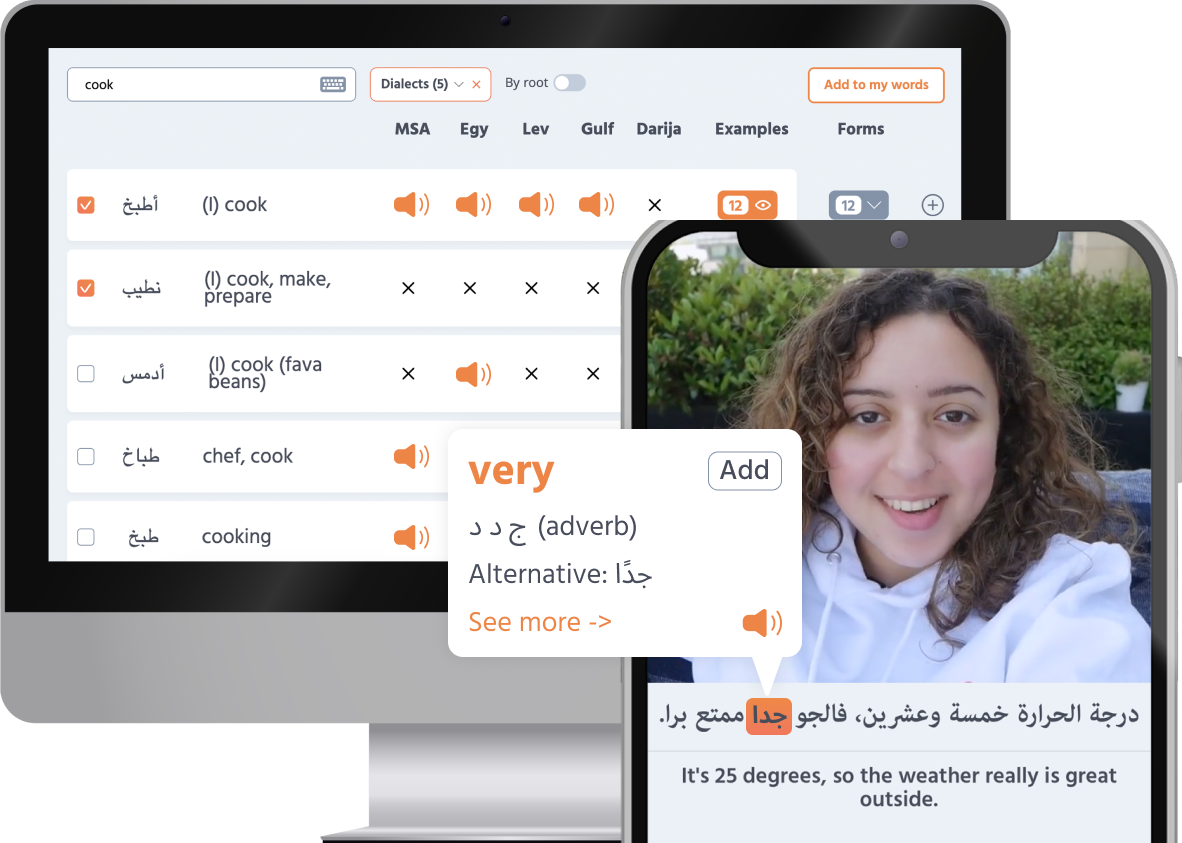In any language, pronouns ضمائر
play a really important role in putting sentences together and getting messages across smoothly. Unlike English, Arabic pronouns often attach to other words, with variations in spelling and pronunciation across regions, making it challenging to use them correctly. Let’s take a look at their different shapes and uses.
Varieties of pronouns in Levantine Arabic Pronouns in Levantine Arabic can be broadly classified into four categories: subject pronouns, object pronouns, possessive pronouns, and reflexive pronouns.
Subject pronouns Subject pronouns signify the performer of the action, i.e., the subject of the sentence. Although often omitted due to verb conjugation implying the subject, subject pronouns are utilized for emphasis or clarity. The following are subject pronouns in Arabic:
I ( أنا
)أنا رايح على السوق
You (singular) ( أنت ِ
أنت َ
) أنت رايح عند احمد بكرا؟
Get free Arabic videos with interactive captions for your level
Get free videos
A Lebanese clip from Playaling. Can you find the subject pronouns? He ( هوّ ِ
هوَّ
) هوَّ جاي من الشغل
(Palestinian & Jordanian )
(Lebanese & Syrian)
A Syrian explaining the benefits of travel and getting to know foreign cultures . Check out the subject pronouns. She ( هيَّ
هيِّ
) هيَّ مهتمة بالفنون
(Palestinian & Jordanian)
(Lebanese & Syrian )
We ( نحنا
احنا
) نحنا منحب نسهر مع بعض
is used:
A Syrian couple talks about their personal life. Look out for the subject pronouns!You all ( انتو
انتم
) انتو شو بدكو تعملوا اليوم؟
From Alwan, a Lebanese TV show for children. What subject pronouns does she use?They ( همّا
هنِّ
هنّن
) هنِّ عاملات مشروبات باردة
In Arabic, when a group consists of both males and females, even if there are ten males and only one female, the group is treated as masculine plural.
Object pronouns Object pronouns point to the recipient of the action, either directly or indirectly. They attach to verbs, signifying who or what is impacted by the action.
Me ( ني
لي
) عطيتني هدية
You (singular) ( ك
) شفتك عالتليفون
Him ( ه
و
) شفته/و بالكافي
(Palestinian & Jordanian)
(Lebanese & Syrian)
Her ( ا
ها
) أعطيتها كتاب جديد
or عطيتها كتاب جديد
A video in Jordanian dialect . Where does use object pronouns? Us ( نا
) جبتلنا بيتزا
You all ( كو
كم
) شفتكو بالمدرسة
شفتكم بالمدرسة
(Palestinian & Jordanian)
شفتكم بالمدرسة
(Lebanese & Syrian)
You all (Lebanese & Syrian) ( كن
)
عطيتكن هدايا
Tips about how to stay safe during the coronavirus pandemic in Lebanese dialect. Check out the object pronouns. Them ( هم
هِن
هُن
ن
) شفتهن بالمنتزه
(Palestinian & Jordanian)
شفتهن بالمنتزه
(Lebanese & Syrian)
(Palestinian & Jordanian)
(Lebanese & Syrian)
Possessive pronouns Possessive pronouns indicate ownership or possession and attach to nouns, reflecting the owner of the noun.
Mine ( ي
) انت ماسك كتابي الجديد
Your (singular) ( ك
) سيارتك شغالة اليوم؟
His ( و
ه
) سيارته لونها احمر
Her ( ا
ها
) سندس شغفها بالفن كبير
Our ( نا
) سيارتنا كبيرة وواسعة
Try identifying the possessive pronouns in this Lebanese clip in Lebanese . Your (plural) ( كن
كم
كو
) سيارتكن حلوة كتير
سيارتكم حلوة كتير
سيارتكو حلوة كتير
A song in the Palestinian dialect about a child refusing to go to sleep . Where do you find possessive pronouns? Their ( هُن
هِن
ن
) ابتسامتهن كتير حلوة
ابتسامتن كتير حلوة
(Lebanese & Syrian)
(Palestinian & Jordanian)
Find the pronouns in this clip of Syrian children answering simple questions. Reflexive pronouns Reflexive pronouns are used when the subject and object of the verb are the same entity, indicating actions performed upon oneself.
Myself (لحالي
) لما صار الحادث كنت لحالي بالسيارة
A Syrian girl tells her mother why she’s sad. Can you find the reflexive pronouns? Himself (لحاله/و
) عمل كل شي لحالو
Herself (لحالا
لحالها
) لحالها عملت كل هادا الأكل
(Palestinian & Jordanian & Syrian)
(Lebanese)
Themselves (لحالن
لحالهم
لحالهن
) تامر وآية طلعوا برا لحالهم
Pronouns are essential for creating sentences. They act as puzzle pieces that indicate who’s performing an action, who it’s happening to, who owns something, or even when someone is acting on themselves. Once you master them, you’ll take your language skills to the next level. To dive deeper into related topics, check out Rise and Shine: Greet like a Local in Levantine Arabic greetings in Arabic , and Ten ways to say “how are you?” in Levantine Arabic
Oh, and by the way… If learning Levantine Arabic at your own pace, with fun, real-world videos sounds like your style, then Playaling could be exactly what you’re looking for!
With Playaling , you’ll dive into Arabic just as it’s spoken in Lebanon, Syria, Jordan and Palestine. Our diverse range of videos has it all—from everyday conversations and cultural moments to music videos, TV and movie clips, influencer content, news broadcasts, and inspiring talks.
Our interactive captions let you tap any word for instant translations, context, and audio. So, real Levantine content becomes accessible with just a click. Miss something? No problem—rewind and listen as often as you need, or hover over subtitles for quick definitions.
Spot a word you want to learn? Save it to your personalized word set, or dive into curated sets for focused practice and easy review.
Interactive exercises let you dive in and practice what you’ve learned.
Need to look something up? The Audio Dictionary has you covered with clear human pronunciations and real world examples.
It’s a learning experience that keeps you engaged, bringing authentic, real-world Arabic closer to you every step of the way.
Give it a try!









